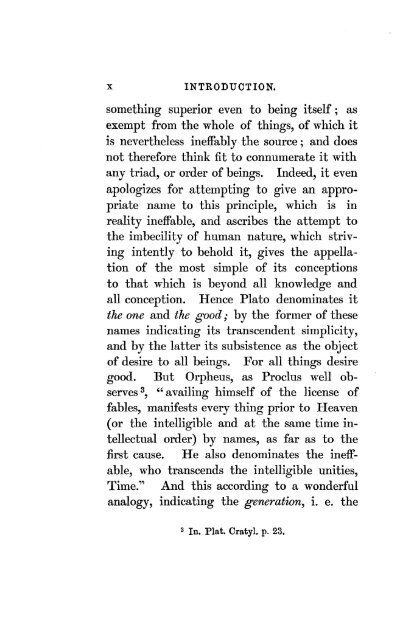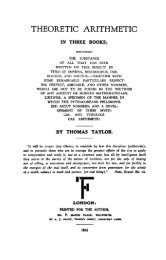- Page 1: THE MYSTICAL HYMNS OF ORPHEUS.
- Page 5 and 6: ADVERTISEMENT. IN the ' Advertiseme
- Page 7 and 8: INTRODUCTION. THE Grecian theology,
- Page 9: INTRODUCTION, ix age, possessed a d
- Page 13 and 14: INTRODUCTION. xiii highest things a
- Page 15 and 16: INTRODUCTION. XV simply considered,
- Page 17 and 18: INTRODUCTION, xvii the God himself.
- Page 19 and 20: INTRODUCTION. xix which this theolo
- Page 21 and 22: INTRODUCTION. xxi the intelligible
- Page 23 and 24: INTRODUCTION. xxiii causally perman
- Page 25 and 26: ISTRODUCTION. xxv tion of which all
- Page 27 and 28: INTRODUCTION. xxvii venerable excel
- Page 29 and 30: INTRODUCTION. xxix by any other mod
- Page 31 and 32: INTRODUCTION. xxxi others about the
- Page 33 and 34: INTRODUCTION. xxxiii of celestial G
- Page 35 and 36: INTRODUCTION. xxxv mysteries, or ha
- Page 37 and 38: INTRODUCTION. xxxvii Farther still,
- Page 39 and 40: INTRODUCTION. xxxix he says, " that
- Page 41 and 42: ISTRODUCTION. xl i jection of the D
- Page 43 and 44: INTRODUCTION. xliii opinion, that i
- Page 45 and 46: INTRODUCTION. xlv as from a perenni
- Page 47 and 48: INTRODUCTION. xlvii himself ; night
- Page 49 and 50: INTRODUCTIOK. xlix So great indeed
- Page 51 and 52: INTRODUCTION. li bians; and on this
- Page 53 and 54: INTRODUCTION. liii With respect to
- Page 55: that such a pursuit must be a great
- Page 59 and 60: THE LEARN, 0 Musaeus, from my sacre
- Page 61 and 62:
OF ORPHEUS. Saturn and Rhea, and gr
- Page 63 and 64:
End and Beginning (greatest this to
- Page 65 and 66:
OF ORPHEUS. 9 Guard of the race, en
- Page 67 and 68:
OF ORPHEUS. I I Hear, blessed Venus
- Page 69 and 70:
OF ORPHEUS. Dissolving anxious care
- Page 71 and 72:
OF ORPHEUS. By Fate's decree you co
- Page 73 and 74:
OF ORPHEUS. TO ETHER. THE FUMIGATIO
- Page 75 and 76:
Ericapous, celebrated pow'l; Ineffa
- Page 77 and 78:
OF ORPHEUS. v I I. TO THE STARS. TH
- Page 79 and 80:
OF ORPHEUS. Agile and vig'rous, ven
- Page 81 and 82:
OF ORPHEUS. With stars surrounded,
- Page 83 and 84:
OF ORPHEUS. Mother of ages, fruit-p
- Page 85 and 86:
OF ORPHEUS. THE FUMIGATION FROM ARO
- Page 87 and 88:
OF ORPHEUS. Pure ornament of all th
- Page 89 and 90:
Ol? ORPHEUS. Thron'd on a circling
- Page 91 and 92:
OF ORPHEUS. 35 Thee, shepherds, str
- Page 93 and 94:
OF ORPHEUS. XI I. TO HERCULES. HEAR
- Page 95 and 96:
OF ORPHEUS. Thy mighty head support
- Page 97 and 98:
XIV. THE FUMIGATION FROM AROMATLCS.
- Page 99 and 100:
OF ORPHEUS, 43 Thou joy'st in mount
- Page 101 and 102:
OF ORPHETJS. 45 Mother of Gods and
- Page 103 and 104:
OF ORPHEUS. Ev'n Nature trembles at
- Page 105 and 106:
OF ORPHEUS. 49 Propitious hear my p
- Page 107 and 108:
XVII. THE FUMIGATION FROM MYRRH. HE
- Page 109 and 110:
OF ORPHEUS, 53 Thy throne is fix'd
- Page 111 and 112:
The sea all-shining, and each beast
- Page 113 and 114:
OF ORPHEUS. XXI. TO THE CLOUDS. THE
- Page 115 and 116:
XXIII. THE FUMIGATION FROM MYREH. 0
- Page 117 and 118:
OF ORPHEUS. xxv. TO PROTEUS 49. PRO
- Page 119 and 120:
OF ORPHEUS. XXVII. TO THE MOTHER OF
- Page 121 and 122:
OF OEPHEUS. 65 With winged feet 'ti
- Page 123 and 124:
Whose holy form in budding fruits w
- Page 125 and 126:
OF ORPHEUS. XXXI. TO THE CURETES. A
- Page 127 and 128:
OF ORPHEUS. Gymnastic virgin of ter
- Page 129 and 130:
OF ORPHEUS, Hear me, 0 Goddess, whe
- Page 131 and 132:
OF ORPHEUS. XXXIII. TO VICTORY. THE
- Page 133 and 134:
OF ORPHEUS. 77 Rural, light-bearer,
- Page 135 and 136:
OF ORPHEUS. 79 The world's wide bou
- Page 137 and 138:
OF ORPHEUS. 81 Now the last string
- Page 139 and 140:
OF ORPHEUS. All Nature's tribes to
- Page 141 and 142:
OF ORPHEUS, She in Ortygia's honour
- Page 143 and 144:
OF ORPIIEUS. TO THE TITANS. THE FUM
- Page 145 and 146:
OF ORPI-IEUS. XXXVIII. TO THE CURET
- Page 147 and 148:
OF ORPHEUS. XXXIX. TO CORYBAS 75. T
- Page 149 and 150:
OF ORPHEUS. In verdure flourishing,
- Page 151 and 152:
XLII. TO MISA. THE FURTIGATION FROM
- Page 153 and 154:
OF ORPHEUS. 97 All-colour'd Seasons
- Page 155 and 156:
OF ORPHEUS. X LV. TO DIONYSIUS BASS
- Page 157 and 158:
OF ORPHEUS, XLVII. TO BACCHUS PERIC
- Page 159 and 160:
OF ORPHEUS. Blest Phrygian God, the
- Page 161 and 162:
OF ORPHEUS. A HYMN, HEAR me, Jove's
- Page 163 and 164:
OF ORPHEUS. 107 With Pan exulting o
- Page 165 and 166:
OF ORPHEUS, 109 Liknitan Bacchus, p
- Page 167 and 168:
OF ORPHEUS. LIII. TO AMPHIETUS BACC
- Page 169 and 170:
OF ORPI-IEUS. TO VENUS. A HYMN. HEA
- Page 171 and 172:
OF ORPHEUS, LVI. TO ADONIS. THE FUM
- Page 173 and 174:
OF ORPHEUS. LVIII. THE FUMIGATION F
- Page 175 and 176:
OF ORPHEUS, Of all that Ceres' fert
- Page 177 and 178:
OF ORPHEUS. LIX. TO THE FATES. THE
- Page 179 and 180:
OF ORPHEUS, LX. TO THE GRACES 97. T
- Page 181 and 182:
OF OORPHEUS. LXII. TO JUSTICE. THE
- Page 183 and 184:
LXIV. TO LAW. THE holy king of Gods
- Page 185 and 186:
OF ORPHEUS, Stay furious contests,
- Page 187 and 188:
OF ORPHEUS. 131 Strong, lenient God
- Page 189 and 190:
OF ORPHEUS, TO THE FUItIES lo4. THE
- Page 191 and 192:
OF ORPHEUS. LXX. TO THE FURIES. THE
- Page 193 and 194:
LXXI. TO MELINOE. THE FUMIGATIOhT F
- Page 195 and 196:
OF ORPHEUS, LXXII. TO FORTUNE. THE
- Page 197 and 198:
OF ORPHEUS. LXXIII. TO THE DIIEMON1
- Page 199 and 200:
OF ORPHEUS. LXXV. THE FUMIGATION FR
- Page 201 and 202:
OF OR'PHEUS. Clio, and Erato who ch
- Page 203 and 204:
OF ORPHEUS, XVIII. TO AURORA. THE F
- Page 205 and 206:
OF' ORPHEUS. LXXX. TO BOREAS Il2. T
- Page 207 and 208:
OF ORPHEUS. LXXXII. TO THE SOUTH WI
- Page 209 and 210:
OF ORPHEUS. 153 Hence every river,
- Page 211 and 212:
OF ORPHEUS. TO VESTA lI4. THE FUMIG
- Page 213 and 214:
OF ORPHEUS. 157 In thee the Gods ha
- Page 215 and 216:
OF ORPHEUS. LXXXV. TO SLEEP. THE FU
- Page 217 and 218:
OF ORPHEUS, But from the wicked tur
- Page 219:
OF ORPHEUS. Not youth itself thy cl
- Page 222 and 223:
166 ADDITIONAL NOTES. been partaker
- Page 224 and 225:
168 ADDITIONAL NOTES. become 810s e
- Page 226 and 227:
1'70 ADDITIONAL NOTES. demiurgus, a
- Page 228 and 229:
172 ADDITIONAL NOTES, energies of t
- Page 230 and 231:
174 ADDITIONAL NOTES. Heaven derive
- Page 232 and 233:
176 ADDITIONAL NOTES. into light ag
- Page 234 and 235:
178 ADDITIONAL NOTES, the second, w
- Page 236 and 237:
180 ADDITIONAL NOTES, is the leader
- Page 238 and 239:
182 ADDITIONAL NOTES. high, viz. th
- Page 240 and 241:
184 ADDITIONAL NOTES. Homerg0 does
- Page 242 and 243:
186 ADDITIONAL NOTES* celebrated. F
- Page 244 and 245:
188 ADDITIONAL NOTES. former as fat
- Page 246 and 247:
190 ADDITIONAL NOTES. part of Heave
- Page 248 and 249:
192 ADDITIONAL NOTES. 3s our whoIe
- Page 250 and 251:
194 ADDITIONAL NOTES. They say then
- Page 252 and 253:
196 ADDITIONAL NOTES. Plato 33 moth
- Page 254 and 255:
198 ADDITIONAL NOTES. porpo@ov $weu
- Page 256 and 257:
200 ADDITIONAL NOTES. vov), or thro
- Page 258 and 259:
202 ADDITIONAL NOTES, punish, and t
- Page 260 and 261:
204 ADDITIONAL NOTES. world, and ci
- Page 263 and 264:
List of Books PUBLISHED BY BERTRAM

















